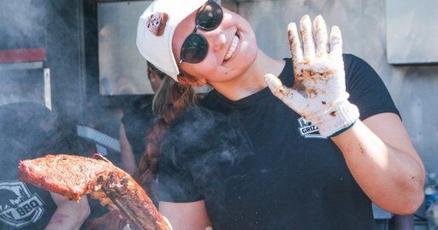As the smoke rises and the tantalizing aroma of barbecue fills the air at Rocky Point Park, Port Moody’s beloved Ribfest celebrates a significant milestone this year—its tenth anniversary. What began as a community gathering centered around barbecue has evolved into something far more substantial: a platform addressing critical food security issues in the Tri-Cities region.
This year’s event, running from July 19-21, comes with heightened awareness of local hunger challenges. “When we launched Ribfest a decade ago, we couldn’t have imagined how it would grow not just in size but in purpose,” explains Jennifer McKinnon, president of the Port Moody Rotary Club, the event’s organizing body. “Last year alone, we raised over $100,000 for local charities, with a significant portion supporting food banks and meal programs.”
The timing couldn’t be more critical. According to recent statistics from Food Banks Canada, food bank usage in British Columbia has increased by nearly 32% since 2019, with the Tri-Cities region seeing similar troubling trends. The cost-of-living crisis has pushed many families who were previously financially secure into positions where they now struggle to put food on the table.
While barbecue remains the centerpiece—with award-winning ribbers from across North America competing for the coveted “Best Ribs” title—the festival has expanded its offerings. This year features a new “Community Kitchen” pavilion where local chefs will demonstrate affordable, nutritious meal preparation using seasonal ingredients.
“Food security isn’t just about access to any food—it’s about access to nutritious food and the knowledge to prepare it,” notes Dr. Eleanor Sanderson, a nutritionist partnering with the festival. “Many families facing financial constraints resort to less healthy options because they’re cheaper and more convenient. We’re trying to change that narrative.”
The event has attracted notable corporate sponsorship this year, including major backing from Thrifty Foods and Save-On-Foods, both committing to matching donations made during the festival weekend. Festival organizers anticipate these partnerships could potentially double their charitable impact.
Beyond the fundraising aspect, Ribfest serves as a crucial community connector. In a region where housing costs continue to climb and many residents commute long distances for work, opportunities for meaningful community engagement have diminished. “Ribfest brings people together across demographic lines,” says Port Moody Mayor Rob Vagramov, who will be judging the rib competition. “It’s one of those rare events where you see families who’ve lived here for generations alongside newcomers who arrived just months ago, all sharing tables and conversations.”
Entertainment this year includes more than 20 local bands performing across three days, with headliners The Phonix, Big City Soul, and Dr. Strangelove taking the main stage each evening. For families, an expanded Kids Zone offers face painting, bouncy castles, and interactive educational activities focused on sustainable food systems.
As Port Moody Ribfest enters its second decade, organizers are already contemplating how to expand its impact further. Discussions about year-round programming centered on food security education and community garden initiatives are underway, suggesting the festival’s influence may soon extend far beyond its three-day July run.
“Ultimately, we want Ribfest to be about more than just a wonderful weekend,” McKinnon reflects. “We want it to spark conversations and actions that make genuine differences in people’s lives throughout the year.”
As thousands gather this weekend to enjoy award-winning barbecue and vibrant entertainment, the question remains: how might this community celebration evolve into a sustainable model for addressing food insecurity in communities across Canada where similar challenges persist?










